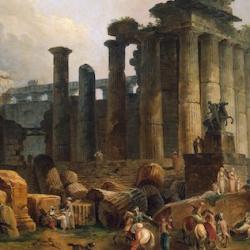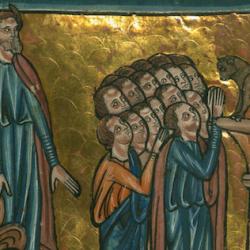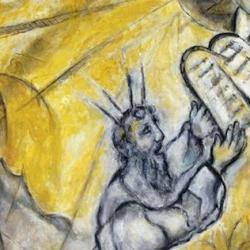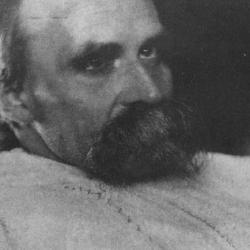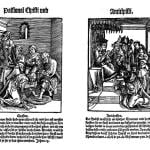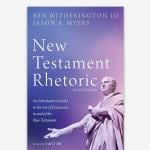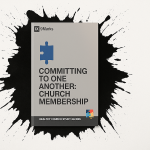Many complain today about the negativity of the Ten Words. Sure, there are a few positive commandments – remember the Sabbath day, honor your Father and mother.
Mostly, though, it’s a list of “Don’ts.” Don’t have other gods, don’t serve images, don’t bear My name lightly, don’t kill, steal, commit adultery, bear false witness, covet. Don’t, don’t, don’t. It inhibits my freedom. God says He brought Israel from slavery, but it seems He just substituted a different form of slavery, slavery to God.
In God’s view, the opposite is the case. These words don’t inhibit freedom. They are the “perfect law of liberty” (James).
They are given to a redeemed people. The Ten Words aren’t given so that Israel can earn his own manumission. The Ten Words are given to a freed slave to teach them how to live in freedom as God’s son.
In Egypt, their bodies belonged to Pharaoh, their time belonged to Pharaoh. We learn at the end of Joshua that Egypt had even won Israel’s religious devotion, his heart. In Egypt, Israel had begun to worship the gods of Egypt.
When Yahweh delivers them from this slavery, He doesn’t deliver them to absolute free agency. Absolute free agency is impossible. In the world God made, the world that actually exists, everyone serves a lord, everyone is a servant to one master or another. The question is not whether we serve but whom we serve. Yahweh has delivered them from the house of slavery (‘ebedim) in order to make Israel the servant (‘ebed) of His house, the son who will serve until he is given authority in the house.
A nation characterized by disrespect for parents, workaholism, violence, envy, theft, lies isn’t free. That is a form of slavery. God’s Word liberates us. God’s law is good. Keeping it is for our good. God speaks to His son Israel to teach him to be free.
The First Word is the foundation of the life of freedom that Yahweh’s son Israel is called to. The most fundamental liberation is liberation from false gods.
Literally, the First Word says, in seven Hebrew words, “There shall not be for you another god before My face.” That has a specific force. “Before Yahweh’s face” means “in His presence,” and specifically “in His presence in the sanctuary.” It’s doesn’t refer to ranking (no God higher than Me) but to position (no God in my presence). The most literal violation of this commandment would be the action of Manasseh, who places another god right in the temple, before the face of Yahweh.
This doesn’t mean, of course, that Israel is free to have other gods outside the sanctuary. Yahweh tells Ezekiel (Ezekiel 14) that the elders of Israel who come to consult him have set up their idols in their hearts. They have made their hearts into shrines for idols. Whenever they come before the face of Yahweh, they bring their idols with them. They set up other gods before the face of Yahweh.
And this is reinforced in the new covenant. We see the face of God in the face of Jesus, and Jesus dwells in our hearts by His Spirit. If we set up idols in our hearts, we are violating the First Word, we are placing idols right before the face of God, just as truly as Manasseh placed another god before Yahweh’s face in the temple.
None of us has a shrine to Baal or Buddha in our basement. Few of us have probably seen actual idolatry in practice. But we shouldn’t fool ourselves into thinking that we’re free of idols, that we don’t need the liberating First Word, “Thou shalt have no other gods before My face.”
The Lord is our Judge, our Savior, our law-giver. He’s the one who blesses and curses, the bearer of our sins, the one we trust, the one who speaks with authority. (The following is indebted to David Powlison.) When we substitute other judges and saviors, when we look to others to bear our sins, when we trust, fear, or love any other before God, we are idolaters. Idols take our hearts and control us.
Are you worried about public opinion? Are you paralyzed by fear about how your father or mother will assess you? Are you pursuing fame? Is that the ultimate aim of your life? Are you afraid of disapproval? You’ve set up an idol, a judge – public opinion, a perfectionist father, a hyper-critical mother – in place of God the Judge. Shatter that idol.
Do you think these thoughts: “If only we had a bit more money, our lives would be happy and fulfilled. If only I could get a better job, or keep a flawlessly decorated home, then my life would be good.” You’ve set up an idol, a savior – money, success, luxuries – that you think will make your life truly and fully blessed.
When you’re cornered, do you lash out and blame others? Do you have so much trouble admitting you’re wrong that you have to scapegoat your wife or husband, your parents or children? You’ve set up an idol, a scapegoat who will bear your sin. Or, do you flagellate and pound yourself for your failures and perceived failures. You’ve set up another idol, made yourself your own sin-bearer, rather than trusting that Jesus has born your sins.
Whose voice is running in your head? What imperatives do you obey? Does the voice in your head come from advertisements, popular songs, YouTube or Netflix shows? We all have lords and masters. There is no such thing as free agency. Who is your true Lord – not your professed Lord, but the one who actually speaks with authority into your life? Who is speaking to you from what holy mountain? If the voice in your head says “Do this,” but the voice from Sinai says “Don’t” – which do you listen to? As soon as, and as much as, you silence the Lord’s voice, you’ve set up an idol, another Lord, in your heart.
Idols like company. Idolatry is inherently polytheistic. Idols feed off one another, pile on one another, shift and move to keep hold of your heart. Your idols may feed off the idols of others. As David Powlison says, co-dependency is more accurately – more biblically – characterized as co-idolatry.
A husband has a drinking problem. At root, Powlison says, it’s an idol problem, and the sanctuary of his heart is teeming with false gods. He loves pleasure more than God; he seeks temporary peace and salvation in an escape into the bottle; his bar mates become his judges, and he lives to gain their approval.
At times, he pulls another god out of the closet: He rages at his wife’s complaints, judging her as if he were God or piling up his own sins on her, as if she were the Suffering Servant. Sometimes, he puts himself on the cross in a fit of remorse. But soon other gods take over and he’s back at the bar.
Meanwhile, his wife’s heart is also infested with idols. She acts out a martyr script, since she’s the only one who can save the family and keep everything together; she judges her husband; she finds comfort in the approval of friends; she stays with her no-good husband because she’s afraid of living without a man’s companionship.
Serving one God must have seemed dangerously restrictive to Israel. After all, there are other gods, other powers and forces in the world. What happens if we neglect one of them? Will he or she become angry? If we neglect the god of fertility, we might be barren. If we neglect some god, we might be missing out.
It sounds foolish, but we are as cast about by our idols as any ancient polytheist. For us there is one God, and one Lord Jesus Christ. And when our worship is directed at that one God, our hearts are single, our desires are focused, our lives take on a coherence they can’t get otherwise. Idols tear us apart, with their contradictory, ever-shifting demands. The only path of freedom is having a coherent life, and the only way to live with coherence and integrity is to keep the First Word, to worship Yahweh alone, not to have other idols before His face.
Your life can’t be coherent without worship of the one God who is Judge, Savior, Law-giving, Sin-Bearer. And the life of a society can’t be coherent if everyone is independently pursuing his own gods.
“Thou shalt have no other gods before Me” is a declaration of independence, a charter for a life and society free of the infinite gods who compete for our love, loyalty, hope, trust, the gods who seduce you to pursue vanities.


